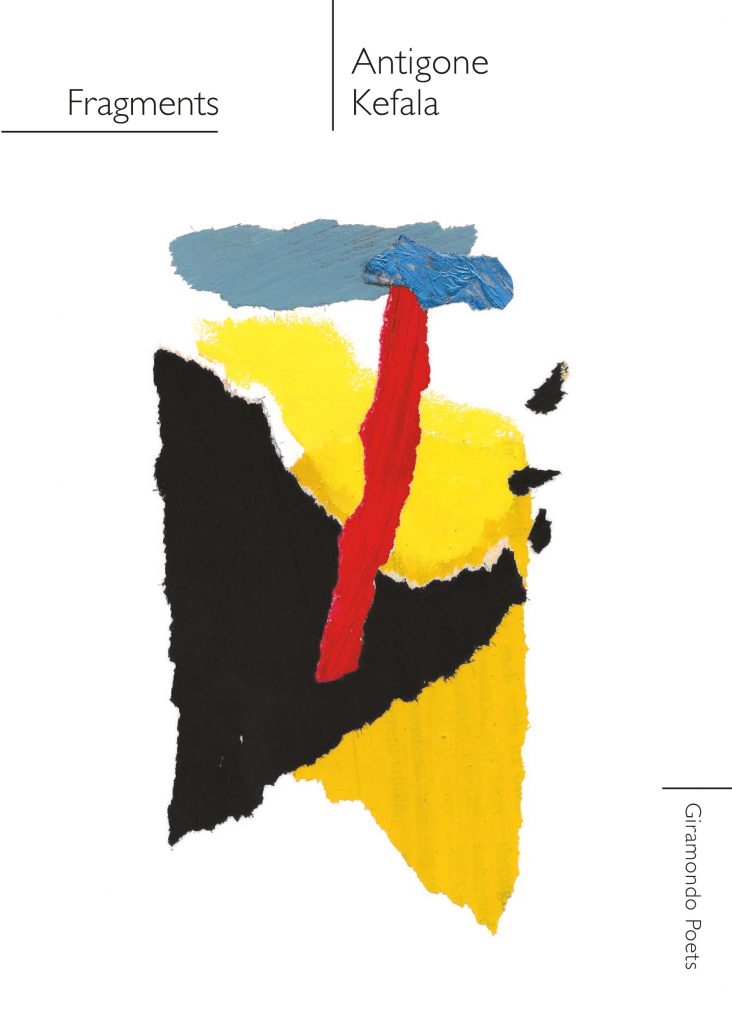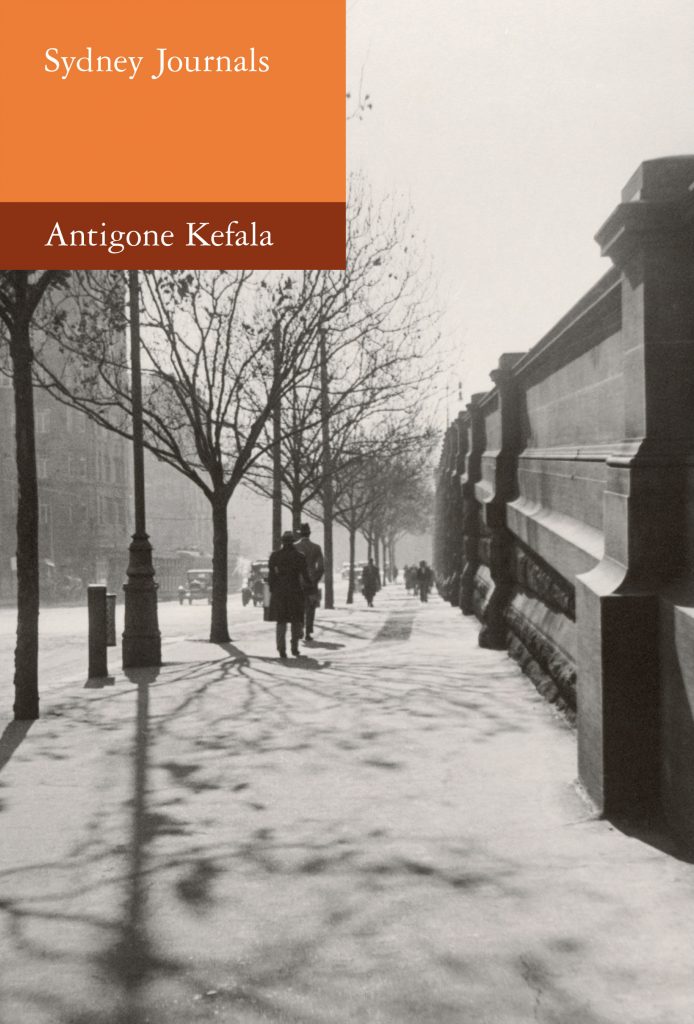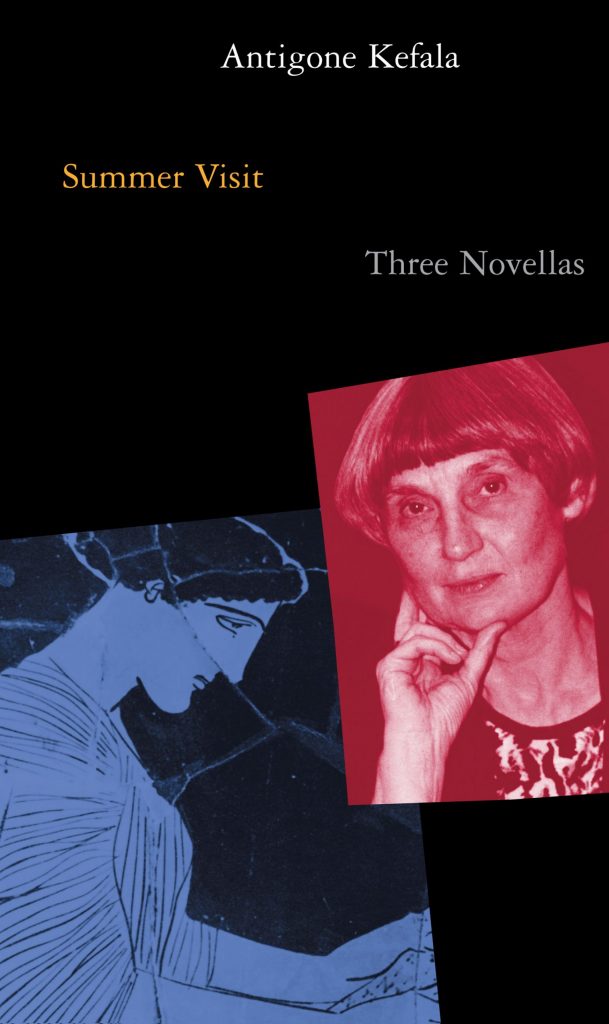Antigone Kefala
Eulogy for Antigone Kefala (1931–2022)
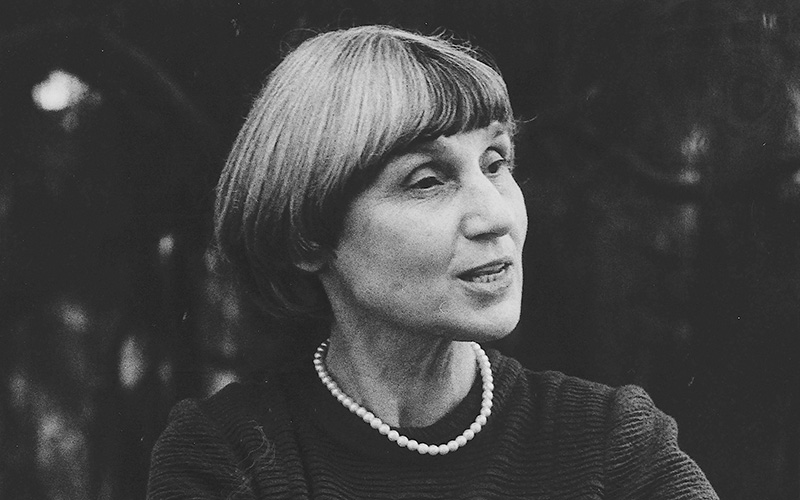
The great Australian writer Antigone Kefala died on 3 December 2022, at age 91. The following eulogy was delivered at the funeral of Kefala at St Spyridon Greek Orthodox Church, Kingsford NSW on Wednesday 14 December 2022.
Antigone Kefala was born in Braila in Romania, a small city on the Danube not far from the Black Sea. Her parents were Greek from a community that had been in Romania for some generations. Her father was a teacher and like her brother a musician, her mother an avid reader. The intimacy of their relationship is beautifully portrayed in ‘Conversations with Mother’, the third of the novellas collected in Summer Visit. In 1947, after the Soviet occupation of Romania, when Antigone was sixteen, the family left for Greece. They lived in a displaced persons camp in Greece for three years, until they were accepted as refugees by New Zealand. In 1959, after graduating from Victoria University in Wellington, Antigone and her mother left for Sydney. Her earliest poems and her first prose work The Island, reflect the trauma and estrangement of this double displacement from Romania to Greece to New Zealand, and the family’s life as refugees. Sydney, on the other hand, exercised an immediate spell, from her first sight of the harbour, ‘shimmering, overflowing with light’. Antigone worked to support the family – as an administrator at the University of New South Wales, and then as multicultural literature officer at the recently formed Australia Council. She was there at the beginning, a supporter of the new writing by Australian authors of migrant background, and one of its most important contributors. In her essay ‘Towards a Language’, she describes how she wrote in the Mitchell Library after work. ‘Typed things out at weekends, surprised myself that I had finally found a voice…with a feeling of levitation, of having escaped the constraints of gravity. The climate, the landscape, my own inner release coincided to give me a feeling of euphoria.’ This unique sense of euphoria permeates her writing, alongside the darker notes, born of the experience of death, loss, and the fragmentation of identity. Her early poetry collections The Alien and Thirsty Weather speak to this experience; in her later collections European Notebook and Absence she revisits the past as it survives in the present and in her memory, in understated lyrics of haunting beauty. But it is in her two collections of journals, Sydney Journals and Late Journals, that her love of the city is most apparent. The journals are not only an enduring record of our life and times, but a tribute to the power of friendship, as many of you here will know. It took a long time for Antigone to receive public recognition – her most recent collection Fragments won Australia’s most prestigious poetry prize in 2017, and only a few weeks before her death, she received the distinguished Patrick White Literary Award. But her friends and readers have for a long time cherished Antigone for her vitality and generosity, her wisdom and curiosity, and the inimitable qualities of her voice, as a poet and as a companion, and will long continue to do so.
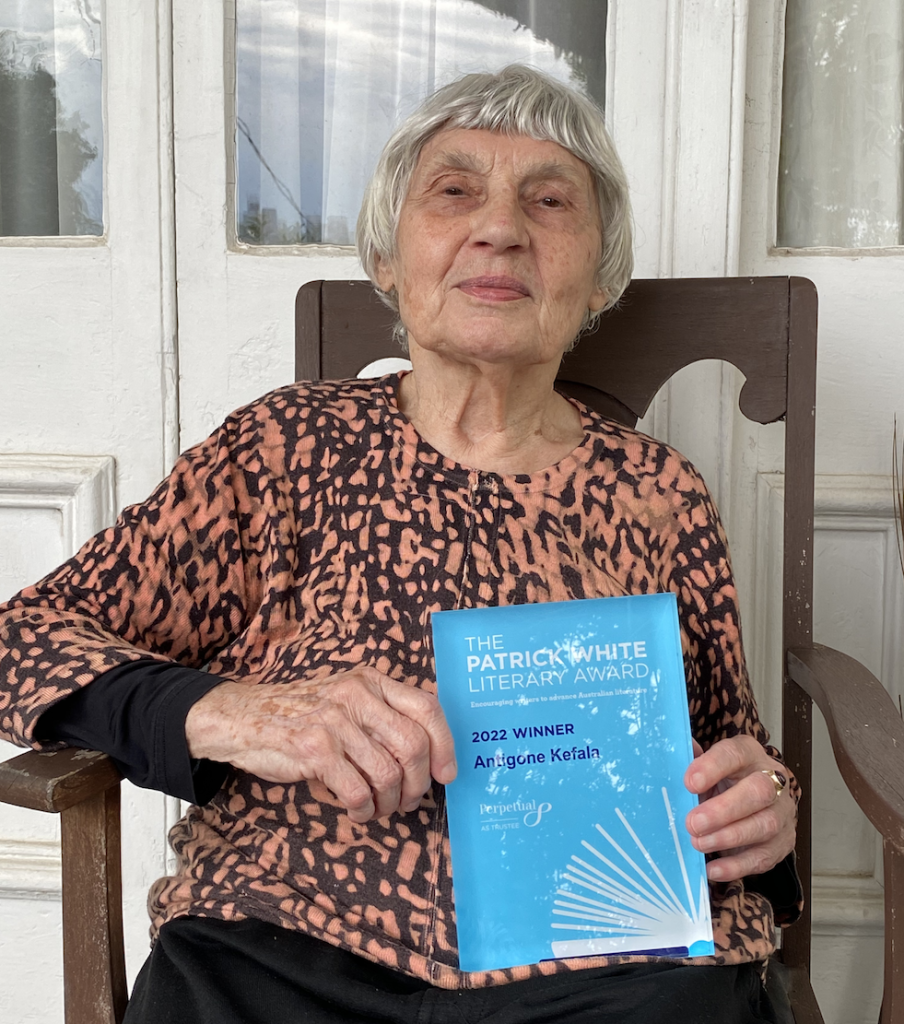
Giramondo Talks: Antigone Kefala in conversation with Ivor Indyk
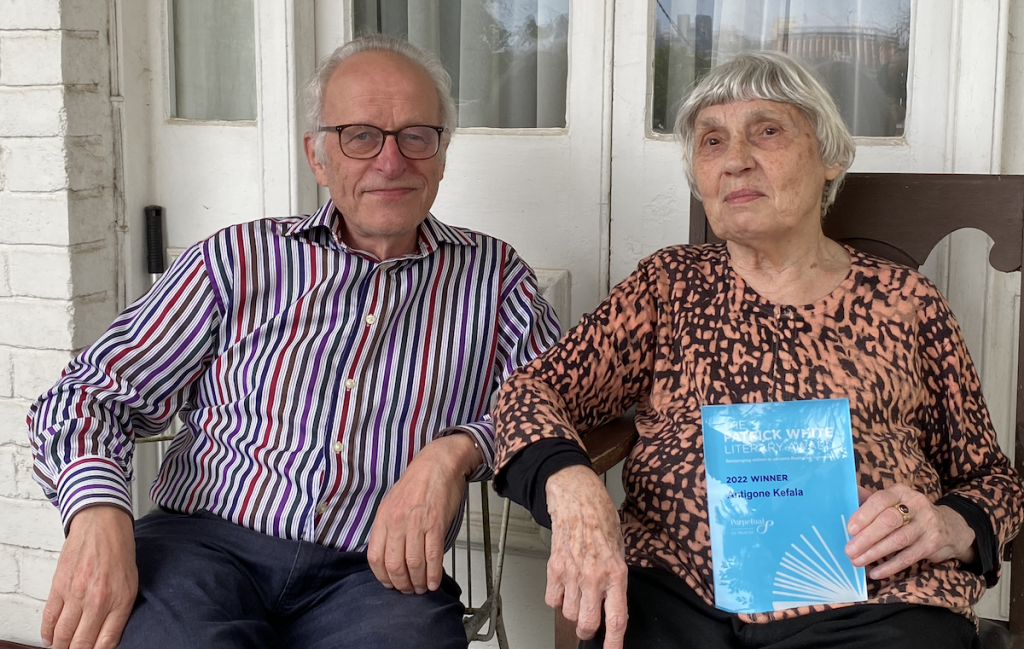
Giramondo launches our new audio series with Antigone Kefala, the Sydney-based award-winning poet and writer of fiction and non-fiction. In a recording made in March 2021, she spoke with Giramondo Publisher Ivor Indyk about her books, her experiences, and her conceptions of poetry and prose.
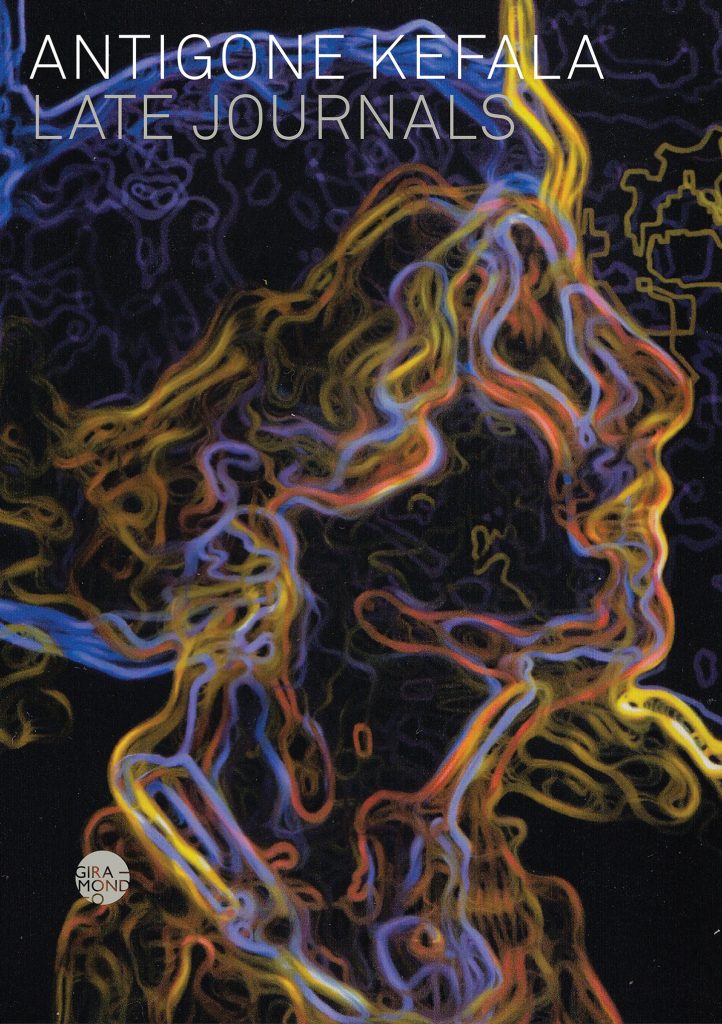
Antigone Kefala wins 2022 Patrick White Literary Award
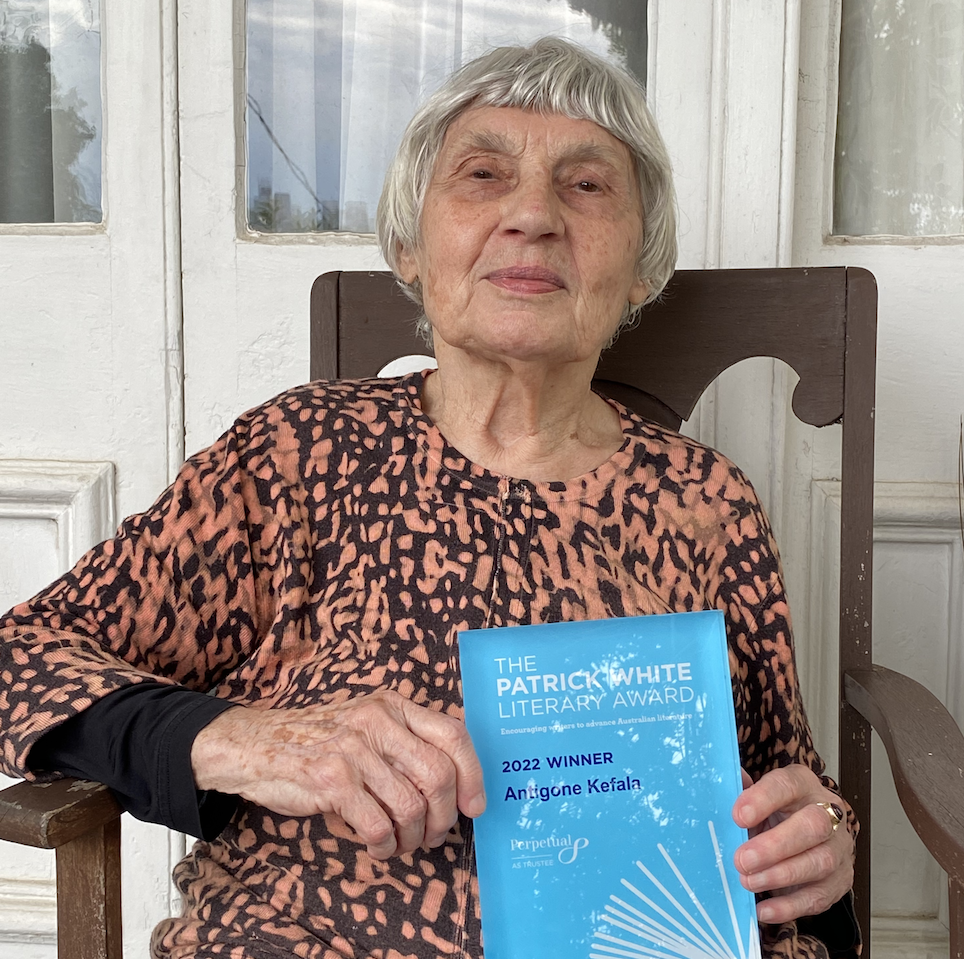
Giramondo is delighted to congratulate Antigone Kefala, who has been announced as the winner of the 2022 Patrick White Literary Award.
The award, presented by Perpetual, recognises Kefala’s achievements as a poet, and a writer of fiction and nonfiction. She has published four works of fiction and five poetry collections, including Fragments, which won the 2017 Judith Wright Calanthe Award and was shortlisted for the Prime Minister’s Award for Poetry. She has also published two collections of journals, Sydney Journals and Late Journals.
On winning the Award, Kefala commented: ‘I am full of admiration for Patrick White, and for the encouragement he has given to Australian writers. I met him several times and liked him. I am very honoured to receive this prestigious award given in his name, and the recognition it offers, as for a long time my writing has existed outside the major lines of Australian literature.’
Kefala will receive $15,000 in recognition of her outstanding contribution to Australian literature. The 2022 judging panel included Dr Felicity Plunkett (Chair), Dr Julieanne Lamond and Ms Michelle de Kretser.
The Patrick White Literary Award was established by Nobel Prize-winning author Patrick White to advance Australian literature ‘by encouraging the writing of novels, short stories, poetry and plays for publication or performance’. For the past 48 years it has been awarded to an author who has made an ongoing contribution to Australian literature but may not have received adequate recognition.
The Award is managed by Perpetual as trustee, and many authors of different status and experience may qualify for consideration. Perpetual Managing Partner of Community & Social Investment, Caitriona Fay said: ‘Patrick White has left a truly remarkable legacy through this award, with many past winners being authors that have made such a significant, yet sometimes understated, mark on the Australian literary community. Kefala’s longstanding contribution to Australian literature through her outstanding collection of fiction, poetry and collection of novellas and journals, encapsulates the very essence of the Patrick White Literary Award.’
Judges’ citation
Antigone Kefala is a poet and a writer of fiction and nonfiction. Born in Brăila, Romania in 1935 to Greek parents, Kefala moved with her family to Greece after World War II, at first living in a refugee camp in Athens. The family initially migrated to New Zealand / Aotearoa, where Kefala earned a MA in French literature at the University of Victoria, and then, in 1959, to Australia. Kefala has worked teaching English as a second language, and as a university and arts administrator with the Australia Council for the Arts, where she was instrumental in establishing supports for community and multicultural arts practice in the 1970s and 1980s. She lives in Sydney.
Kefala has published six collections of poetry and seven prose works. Martin Duwell, writing in the Sydney Review of Books, observes that Kefala’s career ‘is marked by the way in which it embraces almost all of the shorter forms of writing including… short stories, a number of novellas, journals and even a parabolic fairy tale for ‘advanced children’. Her work has appeared in bilingual English-Greek and English-Czech editions, and in a trilingual English-French- Greek edition.
There are two anthologies of criticism of Kefala’s work. Antigone Kefala: A Writer’s Journey collects reviews, essays and analytical writing, and is edited by Vrasidas Karalis and Helen Nickas (Owl Publishing, 2009). Antigone Kefala: New Australian Modernities is edited by Elizabeth McMahon and Brigitta Olubas (UWA Press, 2021).
Kefala is a deliberately spare writer, practising an aesthetics of asceticism that is crucial to the power of her work across all forms. Her poetic minimalism belies the meticulous construction of echoes and patterns in her poetry, while the notable formal compression of both her prose and poetry distils intense experiences and perceptions.
In ‘The Journals of Antigone Kefala’, an essay in the Karalis and Nickas collection, Ivor Indyk identifies ‘powerful expressions of absence and loss [that] stem from her own experience of displacement as a refugee and a migrant’ as central to Kefala’s work.
In their Introduction to Antigone Kefala: New Australian Modernities, McMahon and Olubas write that ‘it would be difficult to overstate the significance of [Kefala’s] life and work in the culture of this nation’. Sneja Gunew notes the rhetorical sophistication and playfulness of Kefala’s writing, and locates it within a cosmopolitan, ‘ex-centrique’ modernism (‘ “To find our measure, exactly, not the echo of other voices”: Antigone Kefala’s Ex-centrique Australian Modernity’ in Antigone Kefala: New Australian Modernities).
Michael Tsiniakis comments on the ‘fundamental error’ of viewing Kefala’s work solely through the lens of multiculturalism/migration. He believes that Kefala has been ‘the victim of her biography’ and emphasises the intellectual underpinning of her writing (‘Antigone Kefala: “Clinical” View over a Shadowy Conscience/Consciousness’ in Antigone Kefala: New Australian Modernities).
Dimitra Harvey writes in Mascara of her early encounters with Kefala’s poetry, noting its ‘stark, radiant imagery; lean punctuation; the slightly disorienting effect of the syntax; an imaginative vision of sensuous waking life enmeshed in subterranean realms of memory and dream’. She praises Kefala’s capacity to evoke the senses ‘with startling vividness’.
Sarah Holland-Batt observes that Kefala’s poems ‘are supremely confident: composed of clean, terse lines, they ride on the rhetorical surety of the speaker’s voice. They invite you to embellish where they remain silent’ (‘The Fragment: on Antigone Kefala’ in Fishing for Lightning, UQP, 2021).
Kefala began publishing poetry in Australian journals and anthologies in the early 1960s. One of her poems appears in the ground-breaking feminist anthology edited by Kate Jennings Mother I’m Rooted (Outback Press, 1975).
Kefala’s first book-length poetry collection was The Alien (Makar Press, 1973). Gunew describes this book as launching ‘a disconcerting Australian poetic voice’ (‘We, the only witness of ourselves’ in Antigone Kefala: A Writer’s Journey). The collection is marked by a sense of strangeness and removal, emotional intensity and a determined ambiguity about the position or context of the speaker. Kefala continued to develop a poetics infused by European frames of reference but ‘welded to an Australian spatiality’ (Gunew) across her succeeding volumes of poetry, Thirsty Weather (Outback Press, 1978), Absence: new and selected poems (Hale & Iremonger, 1992), Poems (Owl Publishing, 2000), Wayfarers and Other Poems (Picaro Press, 2010) and Fragments (Giramondo, 2016).
The fragment is Kefala’s preferred form, evocatively deployed across her practice. A fragment suggests both destruction and salvage, and thus perfectly embodies the preoccupation with loss and renewal that runs through Kefala’s writing. Fragments is the title Kefala chose for her most recent collection of poetry, almost twenty years in the writing and published to acclaim.
Alexis Late writes that in this collection, Kefala ‘faces the disintegration of a life, but the fragments of her past and loved ones are elevated’ (Cordite). Holland-Batt describes these poems as feeling ‘urgent and necessary, full of sharp revelations about life’s fleetingness and the liminal state between life and death’. Efi Hatzimanolis is similarly struck by the poignant sense of time passing in this books. She also notes the ‘many fine poems that create a memorable sense of place in the Australian landscape – indeed there are poems that are almost elegiac in their compassionate view of the fragility of the land’ (‘Feeling for Time for Antigone Kefala’s Fragments’ in Antigone Kefala: New Australian Modernities). Fragments won the 2017 Judith Wright Calanthe Award in the Queensland Literary Awards.
The First Journey (Wild & Woolley, 1975), The Island (Hale & Iremonger, 1984) and Summer Visit: Three Novellas (Giramondo, 2002) are fictions that blur the boundaries between the short story and the novella, while also drawing on poetry in their expressive compression and figurative richness. Jane Gibian points out that this ‘in-between’ formal status mirrors the way Kefala’s work straddles cultures and continents (‘In-between Lives: The Island and Alexia: A Tale of Two Cultures’ in Antigone Kefala: New Australian Modernities). Journeys are a constant in her oeuvre, movement across space and, via memory and dreams, across time.
Like much of her poetry, Kefala’s fictions focus on departures and arrivals, and the disorientation they entrain. ‘I wandered from room to room among unknown people,’ says the narrator of The First Journey, encapsulating the fate of all those displaced by war. Memories and dreams, frequently evoked, are the refugee/migrant’s resource and consolation for loss. Yet at the end of the book, as heavy rain ends a heat wave, the narrator feels ‘free for the first time’, in an acknowledgment that the destruction of the past makes space for invention and possibility.
Konstandina Dounis draws attention to the ‘glorious mosaic’ of women’s lives that Kefala’s work pieces together (‘Antigone Kefala: Of Journeys, Songs and Stories’ in Antigone Kefala: New Australian Modernities). Kefala writes about older women with particular tenderness, as evidenced in her evocative and moving portraits of Aunt Sofia, Aunt Niki and Angheliki in The Island. As Dounis points out, women’s histories, including their very presence, are often invisible; this is especially true in Australia of the histories and presence of immigrants. In rendering such women visible through celebration of their stories and songs, Kefala’s writing resists that erasure.
Summer Visit: Three Novellas (Giramondo, 2002) continues this contemplation of losses and gains, couched in Kefala’s characteristically visual prose. Here the splendour of a new country, and specifically of Sydney, is emphasised: the ‘marvellous city, a living thing breathing in the night. The buildings full of crystal reflections, rising in the night sky sustained by a will of their own.’ The middle section of the book is a meditation on returning. When the narrator of ‘Summer Visit’ goes back to Greece, her memories of the country, like the people and scenes in old photographs, are at odds with the changes she finds. Everything now is ‘looking prosperous’ and people don’t resemble their old, pictured selves. The narrator finds ‘herself longing to escape from here and into her own life’. But when she is finally on her way back to Sydney, she is ‘alone in the dark universe’, in between again in the night sky. The sense of being permanently unhoused is prominent in the last piece, ‘Conversations With Mother’, an exquisite work of mourning that forms part of ‘the glorious mosaic’ noted by Dounis. The mother’s disappearance, at once ‘total’ and ‘impossible’, makes even art seem pointless; the struggle to transcend time leads only to ‘painted images in a dark tomb’. Yet the stories the mother used to tell live on, like the flowers she planted, and with time the narrator once again finds meaning in art and in the natural world.
Sydney Journals (2008) and Late Journals (2022) showcase Kefala’s distinctive, cosmopolitan vision. They are, among other things, wonderful Sydney documents, capturing the city’s changing moods and forms through charged, astute, visually rich observation. Indyk has written about the love of Sydney that runs through Sydney Journals.
Considering the description, ‘The magic of the city in summer, at dusk, holding your breath. The smell of the empty streets, the post office clock glowing in the night…My type of country’, he notes the sense of exultation and belonging implicit in the last phrase. This, he suggests, is ‘in stark contrast to the usual view of Kefala as displaced and in a kind of perpetual mourning for the past’ (Karalis and Nickas).
Similarly, while the loss of community attendant on migration is felt in Kefala’s Late Journals, this work highlights a different, sustaining kinship: the artists and intellectuals Kefala engages with, their presence and their work serving to enrich her days. There is wonderful generosity in Kefala’s acknowledgment of the creative work that matters to her, and a sense of celebration in her intransigent faith in the value and power of art.
Both Anna Couani and Brigitta Olubas have written about Kefala’s centrality to various creative circles in Sydney. This community, embraced by Kefala since the 1960s, isn’t limited to newcomers to Australia, but they constitute a significant proportion of it. Couani remarks on Kefala’s excitement and relief at encountering the ‘urbane, artistic and cosmopolitan’ aspect of Sydney life, and discovering shared experiences. (‘Before whom shall the drama be enacted?’ in Antigone Kefala: New Australian Modernities). While noting that some of the men in these circles were capable of dismissing creative work by women, Couani writes that Kefala’s artistic friends all ‘acknowledged and supported’ her practice.
Olubas, writing of these cosmopolitan ‘networks of friendships’ and their ‘poetics of displacement and self-establishment’, draws attention to the role landscape played in at least one of these creative connections (‘We Had Nowhere To Go: Artist Friendships and Migrant Poetics in the Work of Jurgis and Jolanta Janavicius’ in Antigone Kefala: New Australian Modernities). Late Journals testifies to what Olubas calls ‘friendship grounded [in both] visits to galleries and long drives through the bush and the Australian interior’, a reminder of the significance of both art and place in Kefala’s work.
Kefala’s oeuvre includes two books for younger readers, Alexia: A Tale of Two Cultures (John Ferguson, 1984) and Max: the Confessions of a Cat (Owl Publishing, 2009). However, Gibian points out that the former doesn’t fit neatly into the category of children’s books. She writes that it ‘unfurls multiple possibilities for the expression of the gendered, imaginative and literary self’ (Olubas and McMahon).
If a narrow concept of writing by migrants that would confine it to a certain kind of realism or memoir has affected the reception of Kefala’s work, she has continued, undaunted, to write in her chosen manner regardless of the demands of literary fashion and critical responses. In Sydney Journals, she quotes from Rilke’s Letters to a Young Poet: ‘Works of art are of infinite solitude, and nothing is less capable of reaching them than is criticism’.
Duwell hopes that, with the passage of time, ‘critics, publishers and scholars are a little better at seeing Kefala’s output in some kind of perspective – perhaps, even, seeing it as a whole’. In naming Kefala the winner of the Patrick White Award, the judges acknowledge the scope and range of her work, its precision, insight and distinctive contribution to Australian literature. We also note Kefala’s contribution to Australian literary culture through her work at the Australia Council.
The judges congratulate Antigone Kefala on the award.

